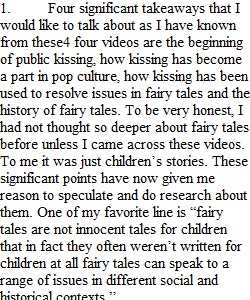


Q Directions: With our first essay final drafts submitted, I want us to move towards the second project of our class where we delve into fairy tales and retellings. For discussion this week, I want you to watch two different TED Talks from scholars of the subject as well as a BBC Podcast episode of You're Dead to Me on Fairy Tales. All the sources we are working with this week have been captioned. Step 1: Watch! For this discussion, please first watch following TED talks and videos: Step 2: Then Listen to the Episode "Fairy Tales" of the You're Dead to Me Podcast from the BBC. Step 3: Post Your Response to the Discussion Board by Friday 1. What are four takeaways or significant points you'd like to share with us from the four videos? Why were these points significant to you? What interested you the most? Share a favorite line or two. (My suggestion is to talk about your biggest takeaway from each of the four videos.) 2. What are at least two takeaways or significant points you'd like to share with us from the podcast episode of You're Dead to Me? Why were these points significant to you? What interested to the most? Share a favorite line or two. I know you just started reading your books, but can you connect anything from the podcast to your novel? 3. What is your past experience with fairy tales and myths? Did you read or have them read to you growing up? Are you or were you a big fan of Disney movies? 4. What was the first fairy tale or folk tale you remember from your childhood? What was so memorable about the experience for you? If you don't remember your first or don't wish to share it, what was your favorite instead? Why did or do you enjoy it? Do you still enjoy fairy tales and folklore now? 5. How has your view of fairy tales or retellings changed since you have watched and listed to these sources? Or what are you most excited to learn more about? What new information stood out to you? 6. Do you have any questions about the two TED talks, two Youtube videos, or the podcast? Is there anything confusing that we can help you with? (This question is optional.) Step 4: Read and Respond to Your Peers by Sunday Once you have written your responses, you are to respond to two of your peers' posts in at least 100 words each. Reply to two posts that have yet to be responded to by a classmate. If everyone's post has been responded to, evaluate the ones with the least amount of replies. For example, if every student has at least one reply, then respond to the students who only have one or two replies instead of those who have 5 or 6 already. Use your personal experience, if it's relevant, to support or debate other students' posts. If differences of opinion occur, debate the issues professionally and provide examples to support opinions. To reply to a peer, click "Reply" under their post, type your reply in the text box and click "Post Reply." Grading and Submission: To receive the full credit, you must submit initial response on time and respond to two of your classmates on time. Please respond in full sentences and be as detailed as possible. Remember to answer all the required questions asked for in the prompt. Your initial post should be around 300-400 words while your responses should be at least 150 words and go beyond "I agree/disagree." You may also refer to the rubric attached. For quick tips on your initial post, check out the Writing a Good Discussion . If you need help submitting the discussion, remember to utilize our Canvas Discussion Guide. The following Canvas Guides will help you successfully submit this assignment and review your feedback: ? How do I reply to a discussion as a student? ? How do I edit or delete discussion replies as a student? ? How do I view and sort discussion replies as a student? ? How do I view the rubric for my graded discussion?
View Related Questions